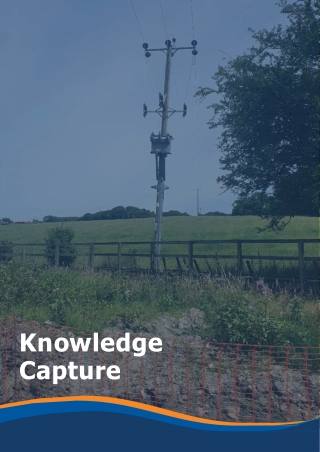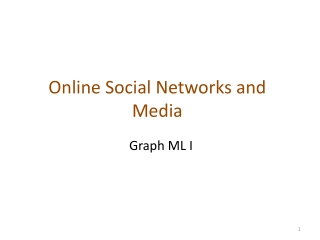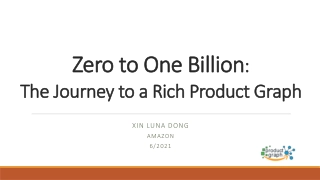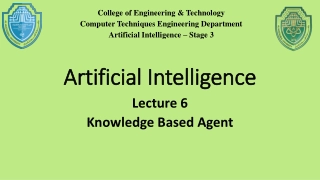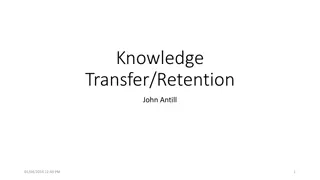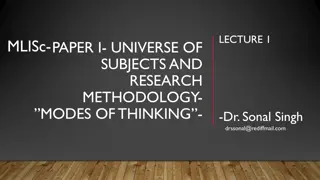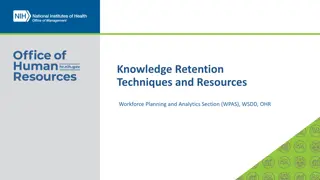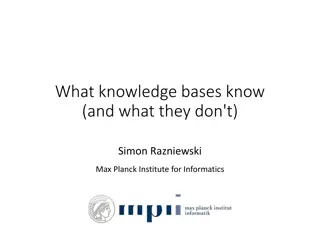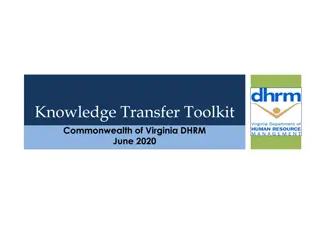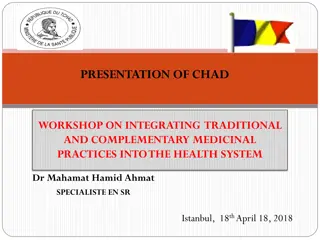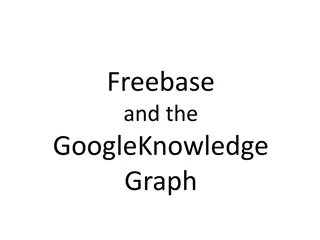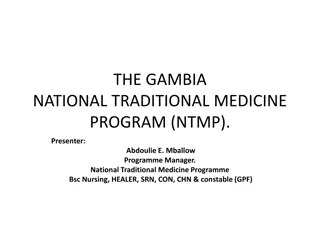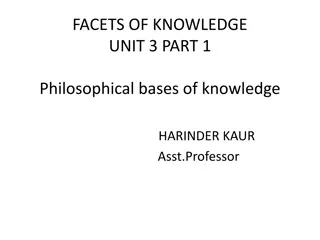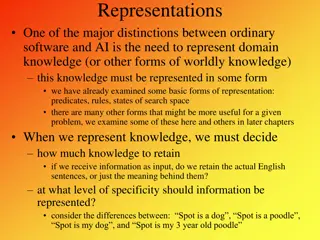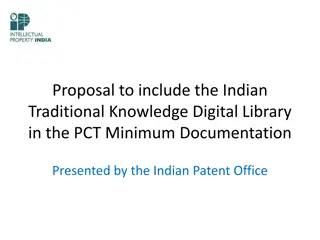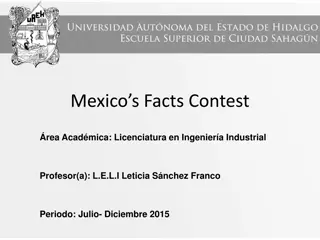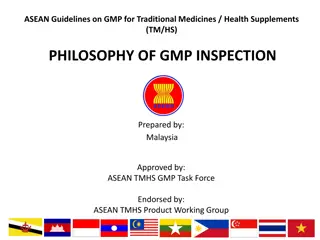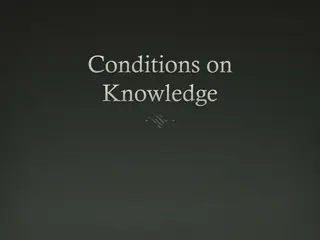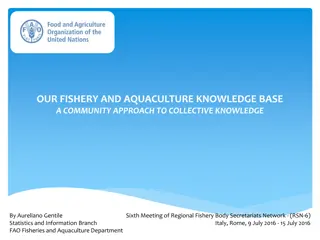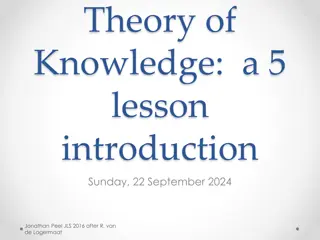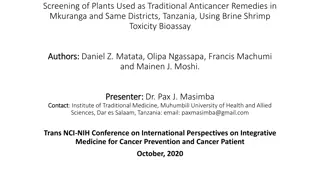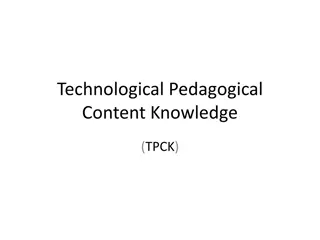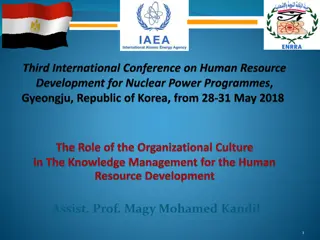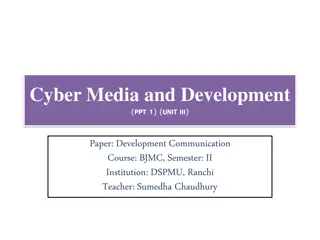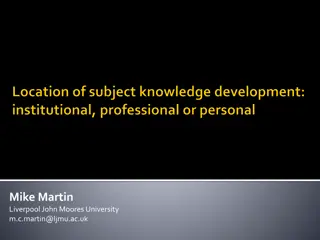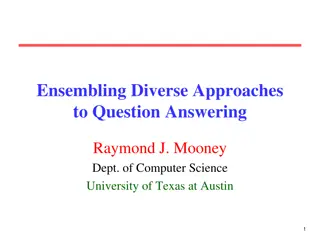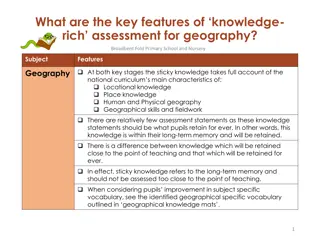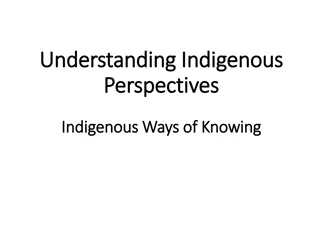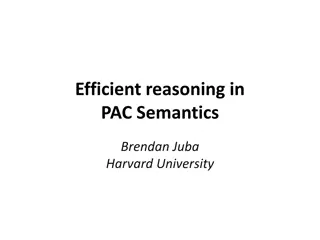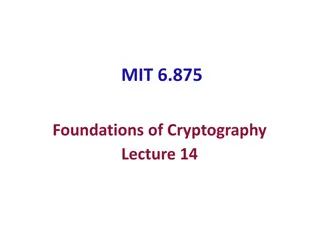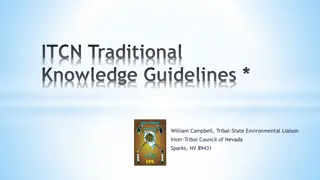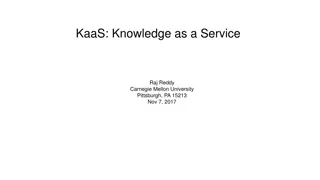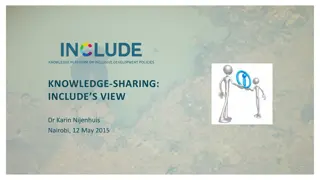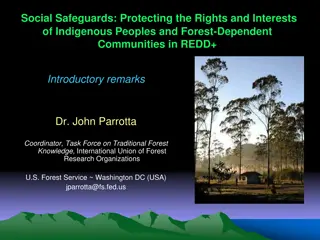Knowledge Capture
Knowledge capture is crucial for organizations to retain valuable expertise and prevent loss of critical knowledge due to employee turnover. Tacit and explicit knowledge play key roles, requiring strategic planning for retention, incentivizing knowledge-sharing culture, and implementing effective st
0 views • 6 slides
Graph Machine Learning Overview: Traditional ML to Graph Neural Networks
Explore the evolution of Machine Learning in Graphs, from traditional ML tasks to advanced Graph Neural Networks (GNNs). Discover key concepts like feature engineering, tools like PyG, and types of ML tasks in graphs. Uncover insights into node-level, graph-level, and community-level predictions, an
3 views • 87 slides
Exploring Product and Knowledge Graphs for Enhanced Information Retrieval
Dive into the world of product and knowledge graphs, uncovering the journey to a rich product graph, examples of knowledge graphs for songs, and the mission to provide comprehensive information on products and related knowledge. Discover use cases ranging from information provision to enhancing sear
3 views • 76 slides
Understanding Knowledge-Based Agents in Artificial Intelligence
Knowledge-Based Agents in AI utilize logic and knowledge representation to accept tasks, learn, and adapt to changing environments. Logic plays a crucial role in forming complex world representations and deriving actions based on inference. The central component is the Knowledge Base (KB), represent
4 views • 19 slides
Understanding Knowledge Management: Processes and Frameworks 2. In knowledge management, organizations create, share, and manage knowledge to enhance performance. It involves acquiring different types of knowledge through various means, such as perc
Knowledge Management, Organizational Objectives, Types of Knowledge, Tacit Knowledge, Explicit Knowledge
1 views • 17 slides
Pedagogical Shift in Physical Science: Constructing Knowledge Through Learner-Centered Experiences
There is a significant pedagogical shift in physical science education from viewing science as a fixed body of knowledge to emphasizing the process of constructing knowledge. Learners are now placed at the center stage, engaging in inquiry-based learning, critical thinking, and collaborative interac
3 views • 21 slides
Importance of Knowledge Retention in Organizations
Organizations face negative impacts on performance due to the loss of knowledge. Strategies such as exit interviews, mentorship, and knowledge sharing tools are vital for effective knowledge retention. Assessing knowledge retention maturity through various techniques is crucial, aligning with ISO st
0 views • 11 slides
Understanding Modes of Thinking and Knowledge Development
Man's acquisition of knowledge is intricately linked to his ability to think, reason, and perceive. Knowledge is a result of experiences gained through perception, intellect, and intuition. The history of humanity is a story of knowledge acquisition and development, with man at the forefront as the
1 views • 18 slides
Effective Knowledge Retention Strategies in Workforce Planning and Analytics
Retaining knowledge is crucial for organizations to enhance customer service, foster innovation, improve efficiency, and bridge skill gaps. This article explores the significance of knowledge retention, the types of knowledge essential for succession planning, and two effective strategies - the Know
1 views • 10 slides
Exploring Knowledge Base Construction and Commonsense Knowledge in Fiction
Delve into innovative research interests focusing on knowledge base construction using fictional texts as archetypes, taxonomies for constructing knowledge bases, and extraction of commonsense knowledge from diverse sources. Challenges such as sparsity and semantics are addressed through comprehensi
3 views • 48 slides
Understanding REST API Basics and Traditional Web Applications
Explore the fundamental concepts of REST API and traditional web applications, including client-server interactions, the role of HTML and HTTP, drawbacks of traditional approaches, the significance of APIs, different types of web APIs, and the principles underlying Representational State Transfer (R
3 views • 21 slides
Knowledge Transfer Toolkit for Organizational Success
This toolkit, developed by the Commonwealth of Virginia DHRM in June 2020, covers the essentials of knowledge transfer, including its definition, impact, challenges, and management strategies. It emphasizes aligning knowledge transfer with strategic goals, overcoming barriers through leadership supp
2 views • 15 slides
Chad Workshop on Integrating Traditional and Complementary Medicinal Practices
Chad held a workshop on integrating traditional and complementary medicinal practices into the health system, emphasizing the importance of traditional medicine alongside modern medical care. The presentation highlighted the country's population, reliance on traditional medicine, legal frameworks, a
0 views • 12 slides
Evolution of Freebase and the Google Knowledge Graph
Freebase was initially created in 2005 as an open shared database of knowledge, later acquired by Google and absorbed into the Google Knowledge Graph. Its approach included crowdsourcing updates and additions, focusing on data rather than text. The schema of Freebase included around 1500 types, 3500
1 views • 12 slides
Approaches to Study Comparative Politics: Traditional vs. Modern Perspectives
This chapter discusses the importance of approaches in the study of comparative politics, categorizing them into traditional and modern perspectives. Traditional approaches include philosophical, historical, and traditional institutional approaches, highlighting their strengths and limitations. Mode
0 views • 7 slides
Traditional Medicine Integration into Gambian Health System
The Gambia's National Traditional Medicine Program aims to integrate traditional and complementary medicine practices into the health system. Established in 2001, the program faces challenges in regulating practitioners and ensuring the safety of herbal products. Despite these hurdles, it strives to
0 views • 21 slides
Facets of Knowledge: Exploring Philosophical Bases and Types
Delve into the philosophical foundations and types of knowledge with insights on local and universal knowledge, theoretical and practical aspects, and school versus out-of-school knowledge. Understand how facets contribute to extended knowledge about attributes within different frames.
0 views • 10 slides
Understanding Knowledge Representation in Artificial Intelligence
In AI, representing domain knowledge is crucial and comes in various forms like predicates, rules, and search space states. Deciding the level of specificity and form of representation is key. Knowledge can be categorized into procedural, domain, and common sense knowledge, available in forms such a
2 views • 32 slides
Safeguarding Traditional Knowledge: Examples of Patent Challenges
Explore patent challenges involving Indian traditional knowledge, such as the turmeric wound healing and Neem fungi control patents. Learn how prior art and legal opposition successfully protected ancient wisdom from misappropriation.
0 views • 22 slides
Mexican Cultural and Geographical Knowledge Quiz
This activity aims to enhance knowledge about Mexico's culture and geography through a quiz format using simple present grammar. Questions cover topics such as food, language, traditional attire, and regional specialties. Explore Mexico's diverse regions and customs while testing your knowledge in a
0 views • 17 slides
ASEAN Guidelines on GMP for Traditional Medicines - Philosophy of Inspection
The ASEAN Guidelines on GMP for Traditional Medicines highlight the Philosophy of Inspection for ensuring quality and safety in traditional medicines and health supplements. The document covers legal terms, audit trail requirements, electronic signature control, and familiar auditor requirements. It
0 views • 88 slides
Exploring Epistemology: Understanding Knowledge and Truth
Epistemology delves into the nature of knowledge, understanding, wisdom, and justification, questioning the extent of human knowledge and the different kinds of knowledge. It explores skepticism and conditions on propositional knowledge, discussing whether knowledge implies truth and the debate betw
1 views • 54 slides
Navigating the World of Big Data, Knowledge, and Crowdsourcing
The world has evolved into a data-centric landscape where managing massive amounts of data requires the convergence of big data, big knowledge, and big crowd technologies. This transformation necessitates the utilization of domain knowledge, building knowledge bases, and integrating human input thro
1 views • 5 slides
Enhancing Fisheries and Aquaculture Knowledge for Sustainable Development
The Fishery and Aquaculture Knowledge Base, presented at the Sixth Meeting of Regional Fishery Body Secretariats Network, focuses on collective knowledge exchange in the fisheries and aquaculture sector. This knowledge hub offers a wealth of information on various aspects, supporting Sustainable Dev
0 views • 13 slides
Exploring the Nature of Knowledge in Theory of Knowledge
Delve into the essence of knowledge with Jonathan Peel's introduction to Theory of Knowledge, pondering on how different disciplines perceive knowledge, the impact of empirical questioning, and timeless wisdom on ignorance and progress. Explore the concept of basic knowledge and its implications, in
0 views • 37 slides
Understanding Modelling Knowledge and Knowledge Representation
Explore the significance of modelling knowledge through knowledge representation, making it explicit, independent, and reusable. Learn why knowledge representation is essential and how it facilitates exchange, query, inference, and visualization. Delve into examples of knowledge application in vario
0 views • 30 slides
Screening of Plants Used as Traditional Anticancer Remedies in Tanzania
Traditional Health Practitioners in Mkuranga and Same Districts, Tanzania, shared ethnomedical knowledge on medicinal plants used for cancer management. A total of 25 plant species were identified, with 56% showing brine shrimp toxicity. Potential anti-cancer candidates such as Ochna mossambicensis
0 views • 5 slides
Understanding Technological Pedagogical Content Knowledge (TPCK)
Technological Pedagogical Content Knowledge (TPCK) is a framework developed by Punya Mishra and Matthew J. Koehler that integrates content, pedagogy, and technology for effective teaching. TPCK emphasizes the interaction between these three key components to enhance technology integration in educati
0 views • 55 slides
Enhancing Human Resource Development through Knowledge Management
Monitoring and improving human performance in nuclear facilities is a key challenge, with knowledge management playing a crucial role in increasing staff competence. Organizational culture influences knowledge-sharing success. Explore the components of knowledge management, its importance in nuclear
0 views • 17 slides
The Impact of Cyber Media on Traditional Journalism
Cyber media, a merging of cybernetics and media theories, poses challenges to traditional journalism as it transitions to the online realm. With the rise of new media platforms, traditional journalists face uncertainty in adapting to the changing landscape dominated by citizen reporting and social m
0 views • 6 slides
Understanding Subject Knowledge Development in Education
Exploring the complexities of subject knowledge development in education, this study delves into areas such as students' existing knowledge, competencies, and the role of institutions in shaping knowledge acquisition. The focus lies on personalizing knowledge to individual needs rather than a fixed
1 views • 22 slides
Ensembling Diverse Approaches to Question Answering
Diverse types of question answering approaches include factoid querying, compositional querying of structured databases/knowledge graphs, reading comprehension, and visual question answering. Limitations of factoid question answering are also discussed, highlighting the need for specific queries and
0 views • 28 slides
Key Features of Knowledge-Rich Assessment in Geography at Broadbent Fold Primary School
Broadbent Fold Primary School emphasizes sticky knowledge in geography assessment focusing on locational knowledge, place knowledge, human and physical geography, and geographical skills. Assessment statements aim to facilitate long-term retention of knowledge, vocabulary acquisition, and fieldwork
0 views • 8 slides
Exploring Indigenous Knowledge in Education
Delve into Indigenous ways of knowing, understanding, and learning, emphasizing the importance of integrating traditional Indigenous pedagogies in education. Learn about the characteristics, sources, and values of Indigenous knowledge, and explore the intersection of Indigenous knowledge with Wester
0 views • 46 slides
Understanding PAC Semantics: Efficient Reasoning in Knowledge Acquisition
PAC Semantics, as explained by Brendan Juba from Harvard University, focuses on efficient reasoning in knowledge acquisition. The concept involves validating rules of thumb, models of partial information, utilizing such information, and developing algorithms for simpler distributions. It addresses t
0 views • 55 slides
Zero-Knowledge Proofs in Cryptography
Exploring zero-knowledge proofs in cryptography, this content delves into interactive protocols, perfect zero-knowledge definitions, and the QR protocol's honest verifier and malicious verifier zero-knowledge theorems. It discusses how simulators work to maintain zero-knowledge properties and the si
0 views • 37 slides
Understanding Traditional Knowledge Guidelines and Principles
Traditional Knowledge (TK) Guidelines and Principles cover important aspects like Free, Prior, and Informed Consent (FPIC), the impact of climate change on Tribal Communities, and the fundamental principles of Tribal Sovereignty over TK. These guidelines emphasize the importance of consent, tribal s
0 views • 17 slides
Evolution of Knowledge in Artificial Intelligence
Explore the evolution of knowledge in AI from traditional sources to data-driven systems, highlighting major breakthroughs and the paradigm shift towards extracting knowledge from new data sources. From expert systems to machine learning and deep learning, discover how AI has progressed to handle va
0 views • 19 slides
Knowledge Sharing and Inclusive Development Policies
Knowledge Platform on Inclusive Development Policies (INCLUDE) focuses on enhancing research utilization in policy-making to foster more inclusive development. It was established in 2012 with the aim of bridging the gap between research and policy processes in African countries. INCLUDE engages expe
0 views • 8 slides
Safeguarding Indigenous Peoples and Forest Communities in REDD+
Exploring traditional forest knowledge and its importance to culture, livelihoods, and conservation efforts. The IUFRO Task Force focuses on preserving traditional knowledge, addressing threats, and identifying opportunities for collaboration with modern forest science. Unique features include susta
0 views • 10 slides
